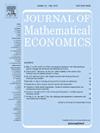Design tools for all-pay contests: Aligning incentives and balancing the playing field
IF 0.7
4区 经济学
Q3 ECONOMICS
引用次数: 0
Abstract
In contests where players compete across multiple dimensions, we compare two main design tools available to a designer with a fixed prize budget: prize allocation, which distributes the budget across independent single-dimensional contests, and the scoring rule, which awards the entire budget to the winner based on weighted overall performance. In an all-pay framework with a multiplicative (designer) payoff, the scoring rule dominates prize allocation through two channels: an incentive-alignment effect, aligning players’ strategies with the designer’s objective, and a balancing effect, which favors the weaker player and raises output. When handicaps are introduced as an additional tool, both players’ equilibrium payoffs are zero, eliminating the balancing effect so that only incentive alignment matters. Finally, with additive (designer) payoffs, outputs are substitutes: the scoring rule continues to outperform under asymmetry but coincides with prize allocation under symmetry.
针对所有薪酬竞争的设计工具:调整激励机制并平衡竞争环境
在玩家跨越多个维度进行竞争的竞赛中,我们比较了具有固定奖金预算的设计师可用的两种主要设计工具:奖金分配(将预算分配到独立的单维竞赛中)和评分规则(基于加权整体表现将整个预算奖励给获胜者)。在具有乘法(设计师)收益的全付费框架中,得分规则通过两种渠道主导着奖励分配:一种是激励一致效应,将玩家的策略与设计师的目标结合起来,另一种是平衡效应,有利于较弱的玩家并提高产出。当障碍作为一种额外的工具被引入时,双方玩家的均衡收益都是零,这就消除了平衡效应,所以只有激励一致性才是重要的。最后,对于累加性(设计者)报酬,产出是替代品:得分规则在不对称情况下继续表现出色,但与对称情况下的奖励分配一致。
本文章由计算机程序翻译,如有差异,请以英文原文为准。
求助全文
约1分钟内获得全文
求助全文
来源期刊

Journal of Mathematical Economics
管理科学-数学跨学科应用
CiteScore
1.70
自引率
7.70%
发文量
73
审稿时长
12.5 weeks
期刊介绍:
The primary objective of the Journal is to provide a forum for work in economic theory which expresses economic ideas using formal mathematical reasoning. For work to add to this primary objective, it is not sufficient that the mathematical reasoning be new and correct. The work must have real economic content. The economic ideas must be interesting and important. These ideas may pertain to any field of economics or any school of economic thought.
 求助内容:
求助内容: 应助结果提醒方式:
应助结果提醒方式:


